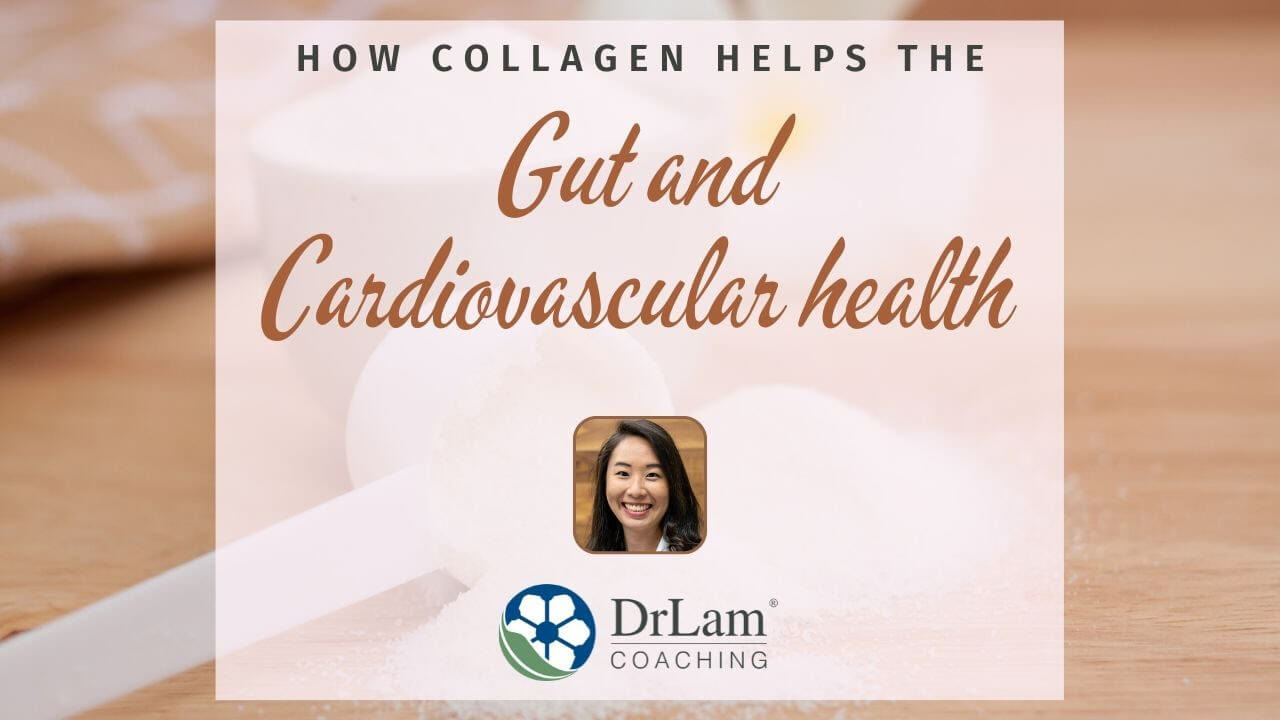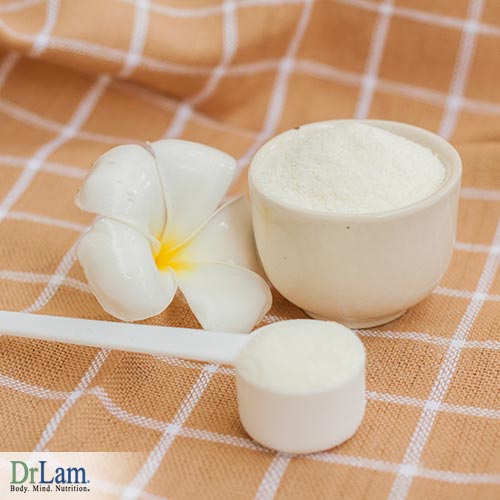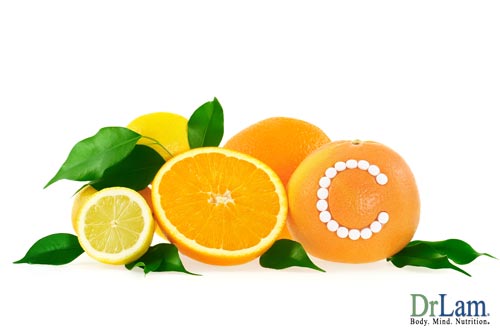
Collagen benefits the entire body. In fact, collagen is the main protein of connective tissues such as skin, cartilage, tendons and bones. It makes up around twenty-five percent of the protein content of the body. It is what maintains the integrity of the extracellular matrix and makes up one to two percent of muscle tissue.
 The most well known collagen benefits are related to what it can do for hair, nails and skin in particular, especially with regards to the appearance of the skin as we age. In fact, though collagen makes up around twenty-five percent of the overall protein content of the body, it makes up around seventy percent of the protein content of the skin. It is also important for joints, teeth, the cardiovascular system and the gut.
The most well known collagen benefits are related to what it can do for hair, nails and skin in particular, especially with regards to the appearance of the skin as we age. In fact, though collagen makes up around twenty-five percent of the overall protein content of the body, it makes up around seventy percent of the protein content of the skin. It is also important for joints, teeth, the cardiovascular system and the gut.
With age, stress or a catabolic state, collagen production declines and is replaced with proteoglycans and glycosaminoglycans (GAGs). GAGs are water-saturated gels that act as supporting macromolecules to collagen – but are not as good of a support structure as collagen.
As collagen production declines, it is gradually replaced with this weaker alternative, which can result in a number of issues:
Since collagen is the main constituent protein of the skin, the skin is where its decline shows the most. This is also why beauty and anti-aging products are infused with collagen, vitamin C and vitamin E.
Collagen benefits are also very great for gastrointestinal (GI) tract disorders. For example, if you suffer from Leaky Gut Syndrome, where the lining of your gut has been compromised and allows substances to enter the bloodstream, collagen benefits can help plug these “leaks”.
Collagen is actually one of the main nutrients found in bone broth, which is one of the healthiest ways to get a good amount of amino acids in the right ratio. Its high nutritional content helps with tissue repair and gives energy and strength while being gentle on digestion – the reason why chicken soup is so good for you when you’re under the weather.
Adrenal Fatigue Syndrome (AFS) is a collection of symptoms that result from the exhaustion of the adrenal glands, two small organs that rest atop the kidneys. The adrenal glands are responsible for secreting over 50 hormones, including the body’s main anti-stress hormone – cortisol.
When faced with chronic stress, the adrenals are overworked. At first, the adrenal glands begin producing more cortisol than normal to meet the body’s demand for stress regulation. Then at more advanced stages of AFS, they begin to weaken and cortisol output diminishes – leaving stress to cause even more damage to the body and mind. At later stages, adrenal crashes can leave a patient bedridden.
Symptoms of AFS can include:
 The body’s response to stress is not limited to the adrenal glands. It involves the entire NeuroEndoMetabolic (NEM) stress response - a collection of six circuits all working together to combat stress. These circuits are the cardionomic, hormonal, metabolic, detoxification, inflammatory, and neuroendocrine.
The body’s response to stress is not limited to the adrenal glands. It involves the entire NeuroEndoMetabolic (NEM) stress response - a collection of six circuits all working together to combat stress. These circuits are the cardionomic, hormonal, metabolic, detoxification, inflammatory, and neuroendocrine.
Though exercise is important, if you suffer from AFS it has to be done in a way that does not deplete your energy reserves or add to the stress on your body. Certain types of exercise are suitable for each stage of AFS, ranging from adrenal restorative exercises, to adrenal circulation exercises, to adrenal yoga or other adrenal exercises.
The important thing is to make sure you get at least four hours of rest after each exercise session and supplement with a combination of protein, collagen and amino acids in liquid form before and after.
However, it is a must to make sure you are taking this in the right dosage and timing – depending upon your particular state or current level of AFS. Collagen is made up mainly of vitamin C, lysine and proline in high doses, which are sometimes not well tolerated when in the advanced stages – including the catabolic state – of AFS.
An alternative could be to supplement with hydrolyzed collagen in powdered form with a dosage of 5-10 g of types 1 and 3 along with co-factors D-Ribose, L-lysine, L-proline, Coenzyme Q10 and L-carnitine.
This could help raise your energy levels, but should still be taken under supervision as it could lead to constipation, which is already a problematic condition in advanced AFS.
In the early 1900s, two Norwegian physicians studying beriberi paved the way for the discovery of scurvy, which also lead the way for other physicians and scientists to unearth the role of vitamins in food. Not long after, the importance of vitamin C became widely studied.
Vitamin C has come to be known as the immune system booster, but it is also a great antioxidant as well as a significant contributor to collagen production.
Vitamin C, sometimes called L-ascorbic acid or ascorbate, is so critical to health that the lack of it can cause scurvy – a terrible disease – that was more common in earlier times within the sailor community. These sailors crossed the oceans without fresh fruits and vegetables for long periods of time.
Though the daily recommended allowance for vitamin C is only 75 mg, there is still a great amount of research going into the importance of vitamin C and its dosage. Though most healthy individuals can meet the daily recommended allowance through food (an orange provides 65 mg of vitamin C, for example), this may not be sufficient to help rebuild the collagen in the body enough to reverse a catabolic state.
 This is why supplementation may be the way to go for those suffering from health conditions that require a higher dosage.
This is why supplementation may be the way to go for those suffering from health conditions that require a higher dosage.
Other than the prevention of scurvy, vitamin C’s role in collagen building is also crucial in the prevention of cardiovascular disease.
This is because when you have a cardiovascular event such as a stroke or thrombosis in the cardiovascular vessels, it actually reflects the existence of fissures in the inner part of your vascular system - the endothelium. This results from the lack of collagen.
So by rebuilding the collagen through vitamin C, your body’s vascular system becomes more stable, bringing atherosclerosis down.
Along with proline and lysine, two amino acids that are critical in the formation of collagen, Vitamin C is the building block of blood vessels, organ framework and the skin. This triad forms the scaffolding that sustains the body’s organs.
So how does this relate to adrenal fatigue?
Animal studies show that animals under stress (placed on a treadmill, for example) produce 20 times more vitamin C intrinsically. This is because vitamin C is also a building block for hormones - including cortisol.
As human beings we lack the enzymes that create vitamin C, and so it has to be supplied through external sources. Our need for vitamin C also goes up substantially during times of stress – to anywhere from 1000 to 2000 mcg.
For this very reason, the highest concentration of vitamin C in the body is found in the adrenal glands. Collagen benefits aside, if you suffer from AFS – vitamin C is critical for your adrenal function. This is because cortisol is deficient and suboptimal with adrenal fatigue. Therefore, the raw materials necessary to create cortisol – vitamin C, pantethine, cholesterol and other enzymes – are required to reverse adrenal fatigue.
The more stress you are under the more vitamin C is needed for proper adrenal recovery.
It is also important to know that too much vitamin C in too weak of a body can backfire. Vitamin C supplementation is not universally good when you are in an advanced stage of AFS. For reasons not yet understood, vitamin C can be stimulating for the body when you actually need more rest than ever.
Most people in advanced stages of AFS are in a catabolic state, which must be reversed if there is to be any improvement in health and for the recovery from adrenal fatigue. This reversal needs to be slow and gradual in order to avoid adrenal crashes.
This is why with supplementation and nutrition, you need to be very careful. Simply loading up on vitamin C or collagen is not the solution. The condition and stage must first be understood in order to find the proper dosage. For some, this may end up being a small amount, because in this situation more is not necessarily better.
 Fortunately for those who are sensitive to or intolerant of vitamin C, there are new forms of delivery available. Vitamin C can be taken in a blend of fat-soluble vitamin C, liposomal vitamin C (such as LipoNano C) and mineral ascorbates.
Fortunately for those who are sensitive to or intolerant of vitamin C, there are new forms of delivery available. Vitamin C can be taken in a blend of fat-soluble vitamin C, liposomal vitamin C (such as LipoNano C) and mineral ascorbates.
For those taking liposomal vitamin C need only take a small fraction of the recommended dose since it is very bioavailable. The recommended dosage is between one and eight grams daily.
Any adrenal recovery program should include vitamin C as part of the health toolbox, as long as it is done intelligently and carefully – perhaps through dietary coaching with an experienced professional. Once a stable state is achieved, a stronger approach to nutrition and exercise can then be considered.
